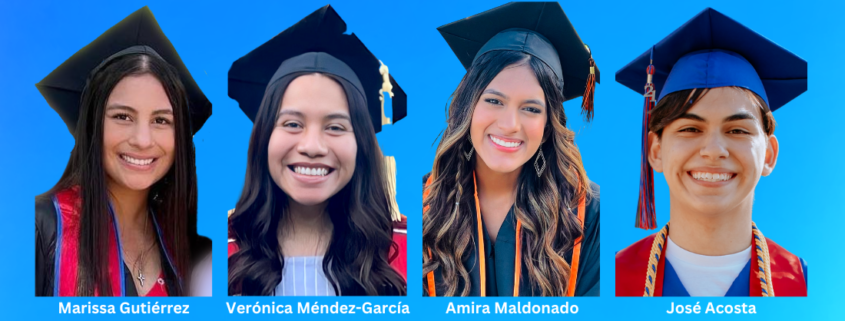CCA Dual Enrollment National Focus Group Features Central Valley Students
A nation-wide communications campaign conducted by Complete College America (CCA) to recruit more Latinx students and other students of color into dual/concurrent enrollment student programs across the United States includes four Central Valley students who participated in CCA’s Dual Enrollment Student Focus Group Sept. 19 via Zoom.
The projected release of the virtual presentation is early 2023, said Dr. Brandon Protas, a strategic director for CCA.
Complete College America is a national nonprofit organization whose mission is focused on significantly increasing college completion rates with a focus on racial equity through an alliance of higher education leaders and organizations – such as partner CVHEC.
Dr. Benjamín T. Durán, CVHEC executive director, serves as one of 48 CCA leads nation-wide who provide oversight and coordination for local initiatives as well as CCA-sponsored projects. Leads act as strategic thought partners and leaders and promote the efforts and importance of CCA, Dr. Protas said.
The alliance sought the student recommendations after seeing CVHEC’s dual enrollment awareness campaign the past year that culminated in a five-minute video, newsletter stories and student panels at two convenings earlier this year. In addition to those students from the consortium’s nine-county Central Valley region, for this national project CVHEC also recruited valley students who attend a college outside the region.
Dr. Protas said the national project sought racially homogenous focus groups of students over 18 who participated in dual/concurrent enrollment in the past four years.
“The aim is to understand what impact DE/CE classes had on students of color, as well as on their motivation to go to college and to earn a certificate or degree and their experiences as a student of color,” Dr. Protas said.
“Information gathered from this national focus group will help create plug-and-play communications assets that can be used for intentional recruitment of dual/concurrent enrollment students who are underrepresented in these programs,” he said. “These would be branded through Complete College America and made available throughout the CCA Alliance to help recruit future high school students into DE/CE programs across the United States.”
The conversations were facilitated by Dr. Stepheny Hinkle Beauchamp, who CCA retained to conduct them through a race-conscious lens, Protas said. Her doctoral research is in dual enrollment rates for Latinos in Colorado.
The CVHEC students participating in the nation focus group are:
- MARISSA GUTIÉRREZ, a graduate of Firebaugh High School who took dual enrollment through West Hills College-Firebaugh Center, earned a bachelor’s degree in psychology at Fresno State. She is now enrolled at University of Northern Colorado earning a master’s degree in clinical mental health counseling while working full time for a local elementary school in Greeley, CO.
- VERÓNICA MÉNDEZ GARCÍA graduated from Madera High School where she enrolled in dual enrollment courses through Madera Community College before earning a Bachelor of Arts at Fresno Pacific University in spring 2022. She also served as student body president (2021-22) and was featured in a CVHEC video regarding broadband disparity. She is now pursuing a master’s at California Baptist University online.
- AMIRA MALDONADO earned an Associate of Arts degree (plant science) through Reedley College’s Wonderful Prep program while at Sanger High School and is now in her second undergrad year at University of California, Davis (human development- sports medicine).
- JOSÉ ACOSTA, a Sanger High School alumnus, took dual enrollment courses through Reedley College’s Wonderful Prep program and is in his second undergrad year at UC Davis (Animal Science).
The students have been enthusiastic in sharing their respective success stories, said Tom Uribes, CVHEC communications/media coordinator who coordinated the local student effort with Saundra McGlothlin, CVHEC regional coordinator and dual enrollment lead.
“We identified students who took just a few dual enrollment classes and found themselves motivated to pursue a higher education and we had some who went all out taking enough courses to earn an associate degree a week or two before they formally graduated from high school,” Uribes said. “All have been very articulate in sharing their respective stories either in our video, newsletter stories or serving on the panels.”




Leave a Reply
Want to join the discussion?Feel free to contribute!